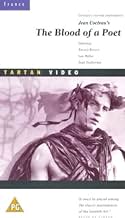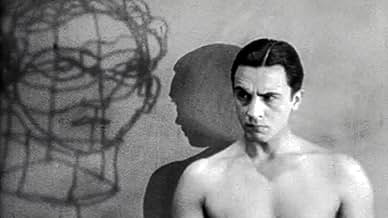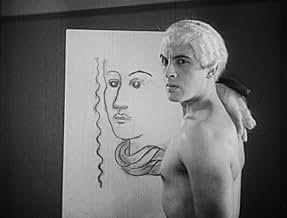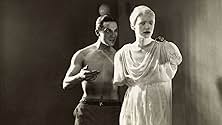CALIFICACIÓN DE IMDb
7.2/10
7.8 k
TU CALIFICACIÓN
Uno de los grandes experimentos del cine, esta primera entrega de la Trilogía Órfica lleva el medio hasta sus límites en un esfuerzo por capturar la obsesión del poeta con la lucha entre las... Leer todoUno de los grandes experimentos del cine, esta primera entrega de la Trilogía Órfica lleva el medio hasta sus límites en un esfuerzo por capturar la obsesión del poeta con la lucha entre las fuerzas de la vida y la muerte.Uno de los grandes experimentos del cine, esta primera entrega de la Trilogía Órfica lleva el medio hasta sus límites en un esfuerzo por capturar la obsesión del poeta con la lucha entre las fuerzas de la vida y la muerte.
- Dirección
- Guionista
- Elenco
- Premios
- 1 premio ganado en total
- Dirección
- Guionista
- Todo el elenco y el equipo
- Producción, taquilla y más en IMDbPro
Opiniones destacadas
I watched "Blood Of A Poet" right after Bunuel's (and Dali's) "Un Chien Andalou" and "L'Age D'Or"; it comes a distant third. It is totally inaccessible (whereas Bunuel's films are equally bizarre but I felt like I was connecting some dots - if perhaps not in the ways that he would have wanted me to!), and pompously self-important (whereas the others are generally playful). It is also blatantly homoerotic - fixated on two strapping, muscular, bare-chested men, one white, one black (not saying that's a good or a bad thing, but it's definitely there). Some impressive photographic tricks cannot sustain even 50 minutes. I didn't understand this film, it didn't make me feel anything, and it didn't entertain me; I gave it a second try, and I liked it even less! But hey, art is subjective, maybe others will get something out of it that I missed (twice). ** out of 4.
A magical little movie that, as another reviewer so well put it, 'means itself'. the imaginatively tame and purely cerebral, of course, shouldn't touch it. i don't much like cocteau's literary work and find it on the whole to be labored, monotonous, pretentious and boring. his verbal 'surrealism' never seemed to me to be worthy of the name, it just seemed like incomprehensible,almost annoyingly sarcastic jargon that made my eyes water. (like some of beckett's stuff.) but cinematically, i can't deny that he could pull it off--and how. i may not be a fan, but i recognize visual surreality when i see it, being an avowed surrealism addict. this one ranks up there with some of bunuel and bergman's stuff in terms of its sheer fascination and genuine merit, and as soon as i finished watching it i watched it again almost immediately. i repeat, don't even bothering trying to interpret it intellectually or rationally, and this applies to surrealist film as a whole. it appeals to the unconscious mind and the imagination, not to reason. (david lynch is the jean cocteau of our time!) A must.
Cocteau's first feature certainly reflects the early idealism of cinema, that "we can do it!" spirit that made early artists truly believe in the potential of cinema as a medium to trump all other arts. Thematically similar to the more famous surrealist work "Un chien Andalou," "Le sang d'un poete" is a chroma-key free-for all, with talking hands, statues that come to life, and banal bourgeoise cardgames transpiring on children's corpses. It's hard to watch at times, made even harder by what I think is a terribly distracting score (to the point where I just turned the sound off and enjoyed the film as a silent with subtitles.) However, by the end one realises Cocteau's heartfelt audacity, and the true spirit of the early cinema artists who wanted to do things with film that nobody has the cojones to try today.
A seminal work in experimentalist cinema; why does it seem like we've fallen way behind?
A seminal work in experimentalist cinema; why does it seem like we've fallen way behind?
The Surrealist movement, as an artistic revolution has been utterly dominated by the name Salvador Dali at least in popular culture. Those in the know may be able to list a few other artists such as Roberto Matta or Max Ernst; perhaps make a tentative connection between Surrealism and Cubism and by extension Pablo Picasso. Even fewer people realize Surrealism has left an indelible impact on film which still seeps into the unconscious of many a-movie. Luis Bunuel's Un Chien Andalou (1929) stands as one obvious example but while Bunuel's career is infamous within cinema circles, many people don't consider French director, writer, and all around renaissance man Jean Cocteau to be part of the movement.
The Blood of a Poet is the first part of Jean Cocteau's Orpheus Trilogy (1932-1960); a loosely connected telling and re-telling of the well-known Greek legend. In this installment, our poet (Rivero) stands in a studio, painting on a canvas with the intensity seen in the most obsessive of human beings. His creations start to come to life, first the paintings then the sculptures. As he discovers the dreamlike dimensions of the room and it's contents, the poet goes into a fugue state falling through mirrors and peering through keyholes. The film ends with the destruction of a factory-type tower or smokestack precipitated by the constant appearance of a muse like figure. By the end she's lying in darkness with a lyre and a globe symbolizing Erato the muse of lyric poetry or maybe Urania the muse of astronomy.
Jean Cocteau is arguably most known for his poetry though he's dabbled in theatre, novel writing and of course film. In the realm of cinema his crowning accomplishment is The Beauty and the Beast (1946) which showed remarkable economy in storytelling and in special-effects. The Blood of a Poet however is a 55 minute concentrated dose of Cocteau at his most creative. Few films today can catapult it's audience into the outer limits of cinematic artistry and with today's spreadsheet, bottom-line obsessed studios there is simply no room for experimentation. Yet in 1930, one man was seemingly given unlimited resources to play with the form and unlike Bunuel's aforementioned Un Chien Andalou and L'Age d'Or (1930), Cocteau's oeuvre concentrates on the sublime not on the grotesque. Interesting to note that Cocteau had been dubbed by his contemporaries "The Frivolous Prince," for his bohemian lifestyle and romantic view of poetry. It certainly shows here.
Those who lived prior to the films release accused it of being anti- religious and delayed its release by two years. Modern skeptics complain that the film is incredibly pretentious and others still, express it is aggressively political in nature. They're not wrong; all the above can be true and false depending on your attitude and disposition. If you're one to take artist intent into consideration Cocteau wrote an essay on The Blood of a Poet contending that it is not a surreal film at all! But rather an attempt to "...avoid the deliberate manifestations of the unconscious in favor of a kind of half-sleep through which I wandered as though in a labyrinth." As with all surreal artwork, the film is ultimately an exercise in personal interpretation.
What remains certain is The Blood of a Poet packs more themes, more story, more experimentation and more beauty in it's scant screen- time than most TV-series' put into their entire run. The ingenuity and raw emotional power embedded in this film is stunning and are sure to bedevil you in your daydreams and in your sleep. I truly, in my heart of hearts believe The Blood of a Poet to be the ideal first film for those wishing to delve into Surrealism. Of course that's just my interpretation; I suppose that's the point.
The Blood of a Poet is the first part of Jean Cocteau's Orpheus Trilogy (1932-1960); a loosely connected telling and re-telling of the well-known Greek legend. In this installment, our poet (Rivero) stands in a studio, painting on a canvas with the intensity seen in the most obsessive of human beings. His creations start to come to life, first the paintings then the sculptures. As he discovers the dreamlike dimensions of the room and it's contents, the poet goes into a fugue state falling through mirrors and peering through keyholes. The film ends with the destruction of a factory-type tower or smokestack precipitated by the constant appearance of a muse like figure. By the end she's lying in darkness with a lyre and a globe symbolizing Erato the muse of lyric poetry or maybe Urania the muse of astronomy.
Jean Cocteau is arguably most known for his poetry though he's dabbled in theatre, novel writing and of course film. In the realm of cinema his crowning accomplishment is The Beauty and the Beast (1946) which showed remarkable economy in storytelling and in special-effects. The Blood of a Poet however is a 55 minute concentrated dose of Cocteau at his most creative. Few films today can catapult it's audience into the outer limits of cinematic artistry and with today's spreadsheet, bottom-line obsessed studios there is simply no room for experimentation. Yet in 1930, one man was seemingly given unlimited resources to play with the form and unlike Bunuel's aforementioned Un Chien Andalou and L'Age d'Or (1930), Cocteau's oeuvre concentrates on the sublime not on the grotesque. Interesting to note that Cocteau had been dubbed by his contemporaries "The Frivolous Prince," for his bohemian lifestyle and romantic view of poetry. It certainly shows here.
Those who lived prior to the films release accused it of being anti- religious and delayed its release by two years. Modern skeptics complain that the film is incredibly pretentious and others still, express it is aggressively political in nature. They're not wrong; all the above can be true and false depending on your attitude and disposition. If you're one to take artist intent into consideration Cocteau wrote an essay on The Blood of a Poet contending that it is not a surreal film at all! But rather an attempt to "...avoid the deliberate manifestations of the unconscious in favor of a kind of half-sleep through which I wandered as though in a labyrinth." As with all surreal artwork, the film is ultimately an exercise in personal interpretation.
What remains certain is The Blood of a Poet packs more themes, more story, more experimentation and more beauty in it's scant screen- time than most TV-series' put into their entire run. The ingenuity and raw emotional power embedded in this film is stunning and are sure to bedevil you in your daydreams and in your sleep. I truly, in my heart of hearts believe The Blood of a Poet to be the ideal first film for those wishing to delve into Surrealism. Of course that's just my interpretation; I suppose that's the point.
Excellent example of early surrealism on film. It is like going through a dream in which images come and go unbidden and with little apparent sense. This film is to be viewed in exactly that spirit. Switch off the need within you to make sense of it, to make it fit a linear state of mind and you will get the most out of it, and be a lot closer to what the director intended. Let the images wash over you, respond to them as images, not as tidy stories with beginnings, middles and endings that we are used to seeing in films. Like a dream it has it's haunting, almost familiar parts that we can know and recognize as well as the parts of our unconscious that we do not see as clearly but still we dream of them. Too bad surrealism in film never took off more than it did. Here we see a hint of the possibilities that still lie before us. Recommended highly.
¿Sabías que…?
- TriviaBecause of the October 1930 scandal around Luis Buñuel's La edad de oro (1930) - another film financed by Le Vicomte de Noailles and Marie-Laure de Noailles, the Paris premiere of this film was delayed until January 1932.
- ConexionesFeatured in Jean Cocteau: Autoportrait d'un inconnu (1983)
Selecciones populares
Inicia sesión para calificar y agrega a la lista de videos para obtener recomendaciones personalizadas
- How long is The Blood of a Poet?Con tecnología de Alexa
Detalles
- Tiempo de ejecución
- 55min
- Color
- Relación de aspecto
- 1.37 : 1
Contribuir a esta página
Sugiere una edición o agrega el contenido que falta
























